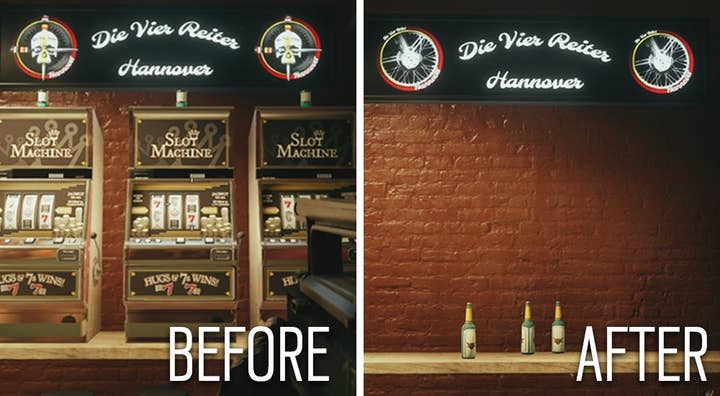On Ubisoft's pandering to unreasonable players
Ubisoft's decision to reverse minor aesthetic changes in Rainbow Six Siege sets an unwanted - and unnecessary - new precedent
It feels like every week we're reading headlines along the lines of 'Players outraged over X', 'Game Y gets review-bombed' - most often over something utterly trivial. It's becoming tiresome how much upset can be caused by minutiae, but at least we could take solace that the 'backlash' was usually a vocal minority with demands that would ultimately never be met.
Or so we thought.
Today, Ubisoft announced it was reversing the aesthetic changes it had planned for Rainbow Six Siege after "our community and players raised concerns". Which, as you'll no doubt have guessed, is putting it mildly.
Within a couple of days of these changes originally being announced, the game's Steam page was besieged by negative reviews bemoaning the decision. Even this week, a smattering of harsh ratings continue to be posted, motivated purely by this alteration.
And what was Ubisoft's heinous crime? Adjusting some minor visual elements and art assets to prepare Rainbow Six for a Chinese release.
"For some, the bare wall where a slot machine once stood might be a reminder that they are not the center of Ubisoft's universe"
Slot machines on a counter in one map were removed. A sexually suggestive neon-lit sign for a strip club was replaced by a more moderate one. A blood splatter across a painting was removed. A few icons were replaced with inoffensive alternatives. O, the horror of it all.
Review-bombers complained that this affects their enjoyment of the game, that it taints their very memory of it. Now, granted, I have personally not played this particular iteration of Rainbow Six, but I fail to see how such minor aesthetic changes would have any impact whatsoever on the gameplay and therefore the actual experience of playing the game.
I understand that, for some, the bare wall where a slot machine once stood might be a permanent visual reminder that this game was not solely developed for them, that they are not the center of Ubisoft's universe, that this is a world with other people who would also appreciate things that cater to them - but these lessons are hard learned, and where better to learn them than from the comfort of your favourite video game?
If Ubisoft had changed the entire art style to resemble a My Little Pony episode and made players shoot bubbles instead of bullets, I could understand the outrage. But the only impact I can envisage is that Ubisoft's ongoing development for Siege will be streamlined - as they announced in the original post - by only having to attend to a single, global version.

This means growth for Ubisoft by getting the title into China, the world's biggest games market, and ensures a larger audience and therefore more players for these devastated defenders of non-interactive slot machines to compete with online.
It's not clear at this stage whether this means Ubisoft now has to make a China-only version, but a spokesperson told GamesIndustry.biz this morning: "China is a strategic market for Ubisoft and it is in our intent to bring the highest-quality Rainbow Six Siege experience to Chinese players, in terms of gameplay, community and esports, same as for any other country. More details about our future plans for China will be announced on due time."
Getting back to the original plan -- yes, such modifications capitulated to the censorship of the Chinese government, as so many players nobly observed in their reviews. But honestly, how harmful is the removal of any of these trivial visual elements in a title where you still run around shooting people in the face? Was a neon stripper central to the vital message the developers were trying to send through the medium of online deathmatches?
"This reversal has given those review-bombers a 'victory', and furthered an expectation the industry could certainly have done without"
Several users 'hilariously' posted "[This review has been censored by the People's Republic of China]" while others made reference to Ubisoft's newfound communist ethos - but I'm fairly sure that modifying a game purely to access the lucrative Chinese audience is pretty capitalist as a business practice.
The problem is this reversal has given those review-bombers a 'victory', as they'll no doubt see it, and furthered an expectation and a precedent the industry could certainly have done without. Because Ubisoft aren't the only ones facing such complaints.
Pokémon Let's Go is also receiving countless negative user reviews over how easy the game is and how much it veers away from the series' mechanics. In this instance, yes, the changes have been significant (far more so than Rainbow Six), but that is the very concept of the game. When Nintendo announced it earlier this year, it was clearly positioned as a title designed to onboard those drawn in by the Pokémon Go phenomenon to the main franchise, while simultaneously confirming a core RPG for 2019 to please Pikachu's most avid fans.
Now it is entirely possible that these negative reviews stem from people who don't follow the games media too closely, who were unaware of the differences between Let's Go and the core series. But even so, if Nintendo and The Pokémon Company capitulated to their cries, would they eventually stop trying to reach out for this new audience for fear of upsetting the established one? These are companies trying to build a cross-generation franchise - developing games solely for people that calculate each critter's IV (that's Individual Value, as the corest of core Pokéfans know) does not serve this strategy.

To an extent, you can understand why Ubisoft has opted to pander to demands for an unchanged international version of Rainbow Six Siege. After all, we saw the hit Activision's shares took after it dared to announce a mobile version of Diablo at the recent Blizzcon. The publisher has since taken steps to appease its fans by confirming other Diablo projects are, indeed, in development -- as we have previously discussed, there are ways to handle gamer entitlement -- but will it be scrapping the mobile version and stop chasing that Chinese pot of gold? Not a chance.
In fact, these examples are likely only the beginning of Western publishers taking their established franchises and tuning them to the tastes of those eager Asian audiences. Because if you're in charge of a major games company, why would you ignore the opportunities afforded by half of the planet?
"Activision has taken steps to appease Diablo fans but will it be scrapping the mobile version and stop chasing that Chinese pot of gold? Not a chance"
And herein lies the crux of it, publishers. By all means, do your utmost to keep your fans happy and deliver the experiences they expect and want - they are, after all, the ones who 'put you where you are today' as so many an irksome internet post has claimed (right, alongside 'Company X doesn't care about the community' and other such nonsense). But it should never be at the expense of your business strategy.
Obviously, I'm not suggesting Ubisoft has altered its course on engaging with Chinese audiences. But if it does indeed have to create a China-only version that meets the government's censorship requirements, that's an additional workload that could have been avoided if a few people accepted that a digital mural looks a little bit different. Or if Ubisoft has built the game with Chinese censors in mind from the beginning - something publishers will no doubt be doing in future. In fact, making games as inoffensive as possible -- thus making it acceptable to all markets -- avoids this issue because, as we have seen, 'fans' will rebel over the most insignificant tweaks.
In such cases, however, the bemoaners are a vocal minority fighting against change, against anything that doesn't fit with their view of what they already have or have had in the past. Holding on to the past or present is not the way to move a business or an industry forward -- especially in a games-as-a-service world where titles are built to develop over time and cater to different markets. And the more publishers are afraid of upsetting their fans, the fewer risks they'll take, the faster our industry will stagnate.
It is impossible to please these people without holding back your business and video games as a medium. What if Disney had succumbed to call for The Last Jedi to be struck from the canon and replaced with a film that was more in line with what fans expected? The latter is equally impossible, as no two fans can comprehensively agree on the future of a franchise they enjoy. Disney is not only pressing on with Episode IX in a way that builds on The Last Jedi, but has a further trilogy planned as well, because the alternative would just lead the company in circles.
The true precedent for video games was, of course, set by EA and BioWare modifying the ending to Mass Effect 3 after widespread cries of disappointment. But Ubisoft's more recent decision is just as concerning - it might just be some trivial art changes in this case, but it sets an expectation and fuels the entitlement that leads to even more baseless backlashes.
Correction: This article erroneously referred to an in-game painting as Chinese. This reference has been removed.








